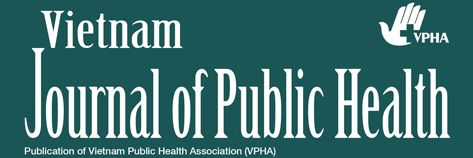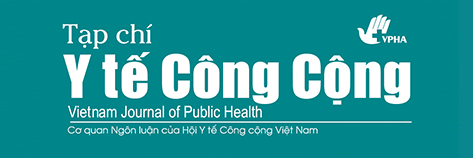- Focus and Scope
- Section Policies
- Peer Review Process and Publishing Process
- Open Access Policy
- Editorial policies
- Peer review policy
- Advertising policy
- Research ethics policy
- Published Conflict-of-Interest Statement
- Published Statement of Informed Consent
- Published Statement of Human and Animal Rights
- Corrections, retractions policy
Focus and Scope
Our VJPH aims to become a prestigious scientific one in Vietnam and the Asia Pacific in providing reliable and qualified research, interventions, and sharing experiences in the field of Public Health for both content and a professional publishing system and user-friendly utility for authors and readers.
Our VJPH will try its best to stimulate an increase of scientific research for both quantity and quality and sharing behavior in the field of public health through the publication of peer review articles with high scientific value compliance with ethical principles. A national wide program for supporting researchers to improve writing skills and publication would also be integrated.Section Policies
Editorial
Commentary
Original Research
Public Health Practice
Review
Peer Review Process and Publishing Process
-11.jpg)
Open Access Policy
This journal provides immediate open access to its content on the principle that making research freely available to the public supports a greater global exchange of knowledge.
Editorial policies
Manuscripts are accepted with the understanding that the authors have not violated any ethical practice followed in preparation and publication of biomedical manuscripts. Author/s is/are responsible for all the statements made in their work and should be willing to defend them publicly, if challenged. Authors should prepare their manuscripts submitted to the journal exactly according to the instructions given. Manuscripts which do not follow the format and style of the journal may be returned to the authors for revision or rejected. The journal reserves the right to make any further formal changes and language corrections necessary in a manuscript accepted for publication. Manuscripts and figures are not returned to the authors, not even upon rejection of the paper.
Peer review policy
The VJPH employs a highly rigorous peer-review process to evaluate manuscripts for scientific accuracy, novelty, and importance. The peer-review process often works to improve research while preventing overstatements of results from reaching physicians and the public. The Journal’s careful editing process often requires extensive revisions and involves detailed checking for accuracy.
Advertising policy
Vietnam Journal of Public Health is a purely scientific journal and currently we do not plan to publish any advertisement in our journal so we don’t have an advertising policy.
Research ethics policy
Within the framework of publication ethics, it is the purpose of the Vietnam Journal of Public Health to contribute to and maintain the integrity of the knowledge record in the defined areas in which the journal publishes. Both the editorial and publication offices of the Vietnam Journal of Public Health monitor all submissions. This includes identifying and preventing the publication of papers where research misconduct inclusive of fraud and errors has occurred. Research misconduct also comprises, but is not limited to falsification and fabrication of data, including, by selection, giving a false impression, plagiarism, false attribution of authorship, lack of ethical approval where required, undeclared conflicts of interest, and the submission and representation of content that has previously been published as original. In no case does it condone misconduct or knowingly allow such misconduct to take place. In the event that VJPH’s publisher or editor(s) are made aware of any allegation of research misconduct, the publisher or editor shall deal with allegations appropriately including investigating the matter, treating the investigation confidentially, contacting and corresponding with the relevant author(s), followed by a published retraction, correction, clarification, and/or apology. If deemed warranted, an article may be removed from the Vietnam Journal of Public Health’s website, and a notice of misconduct may be published in next issue. In extreme cases, VJPH may contact an author’s institution.
Published Conflict-of-Interest Statement
Public trust in the peer review process and the credibility of published articles depend in part on how well conflict of interest is handled during writing, peer review, and editorial decision making. Conflict of interest exists when an author (or the author's institution), reviewer, or editor has financial or personal relationships that inappropriately influence (bias) his or her actions (such relationships are also known as dual commitments, competing interests, or competing loyalties). These relationships vary from those with negligible potential to those with great potential to influence judgment, and not all relationships represent true conflict of interest. The potential for conflict of interest can exist whether or not an individual believes that the relationship affects his or her scientific judgment. Financial relationships (such as employment, consultancies, stock ownership, honoraria, paid expert testimony) are the most easily identifiable conflicts of interest and the most likely to undermine the credibility of the journal, the authors, and of science itself. However, conflicts can occur for other reasons, such as personal relationships, academic competition, and intellectual passion.
Published Statement of Informed Consent
Patients have a right to privacy that should not be infringed without informed consent. Identifying information, including patients' names, initials, or hospital numbers, should not be published in written descriptions, photographs, and pedigrees unless the information is essential for scientific purposes and the patient (or parent or guardian) gives written informed consent for publication. Informed consent for this purpose requires that a patient who is identifiable be shown the manuscript to be published. Authors should identify Individuals who provide writing assistance and disclose the funding source for this assistance.
Identifying details should be omitted if they are not essential. Complete anonymity is difficult to achieve, however, and informed consent should be obtained if there is any doubt. For example, masking the eye region in photographs of patients is inadequate protection of anonymity. If identifying characteristics are altered to protect anonymity, such as in genetic pedigrees, authors should provide assurance that alterations do not distort scientific meaning and editors should so note.
The requirement for informed consent should be included in the journal's instructions for authors. When informed consent has been obtained it should be indicated in the published article.Published Statement of Human and Animal Rights
When reporting experiments on human subjects, authors should indicate whether the procedures followed were in accordance with the ethical standards of the responsible committee on human experimentation (institutional and national) and with the Helsinki Declaration of 1975, as revised in 2000 (5). If doubt exists whether the research was conducted in accordance with the Helsinki Declaration, the authors must explain the rationale for their approach, and demonstrate that the institutional review body explicitly approved the doubtful aspects of the study. When reporting experiments on animals, authors should be asked to indicate whether the institutional and national guide for the care and use of laboratory animals was followed.
Corrections, retractions policy
Authors can request a correction for their papers if there were any incorrected information. The request should be handled as a letter to the editor, as print or electronic correspondence. The corrected papers will be reviewed again by editors. If editors decide a correction is needed, VJPH would publish a correction notice as soon as possible detailing changes from and citing the original publication.



